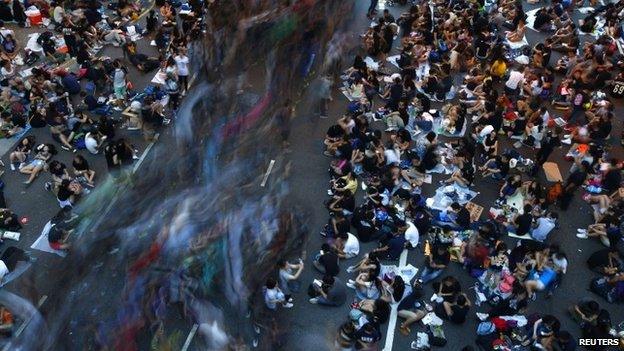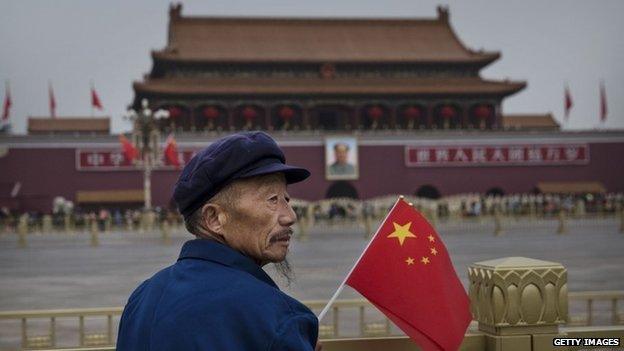Hong Kong protests: China police bar BBC from artists' event
- Published

The protests in Hong Kong have inspired some people in mainland China
China's authorities are adamant that Hong Kong's pro-democracy protests must not spread to the Chinese mainland. Our BBC team learned that the hard way, after scores of Beijing police pushed us and confiscated our journalist cards.
The whole incident started with a hasty invitation. A group of 20 artists was planning an event to support the Hong Kong protests, complete with poetry readings and music.
It was a rare chance to meet people who had been inspired by events in Hong Kong, the people who are making Beijing very nervous.
We drove for an hour outside Beijing to a dusty village. As we approached the village centre, where the event was supposed to take place, a large group of police and local Communist Party officials blocked our path.
The police were "doing things" down the street, they told us. "Go away. There is nothing for you here."
No-one smiled.

Beijing is determined that the Hong Kong protests are not repeated on the mainland
They asked to see our press cards, the pieces of identification proving we are fully accredited with the government. And we were being watched: the whole interaction was being filmed on hand-held video cameras. All the police also had miniature video cameras pinned to their uniforms.
I questioned the police in Chinese. What had happened to the artists? I asked. The artists had invited us to attend their event. Why wouldn't the police allow us to venture near the village centre?
"The villagers don't want foreigners here," we were told. "You're disrupting their quiet way of life."
After several minutes of arguing, the police screamed at us to leave. We started walking towards our car. Then, one officer grabbed my arm and began pushing me.
"Walk faster!" he yelled, clearly desperate for us to go. We stopped short of the car, asking questions again. As accredited journalists in China, why couldn't we conduct any interviews?
During this confrontation, some of the people watching from the sidelines were approached by police and also dragged away. We never had a chance to talk to them, but it's fair to assume they were the artists we were trying to meet.
Minutes later, our press cards were taken away, preventing us from conducting interviews. We'll have to wait for the Beijing police to call us before we can get them back.
Then the pushing and shoving started again, all the way to our car doors.
I have bruises on my arms from the police, but I'm certain anyone planning an event supporting the Hong Kong protesters can expect much more serious treatment.
We don't know what has happened to the artists. Since we left the village, they haven't answered our calls.